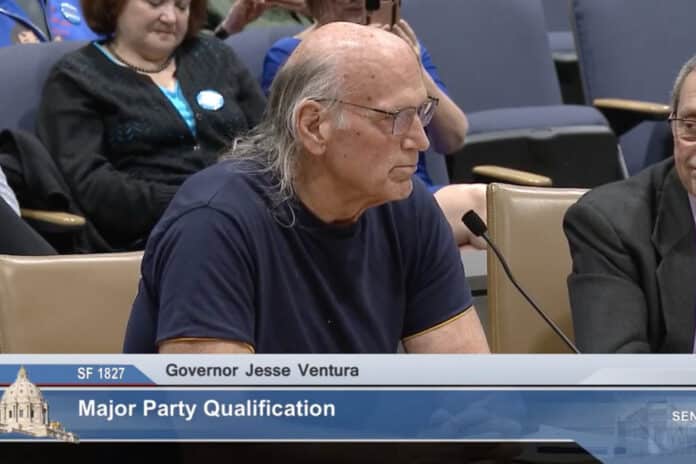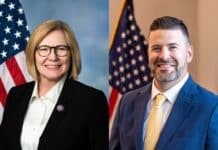
It’s been about a quarter century since professional wrestler turned politician Jesse Ventura “shocked the world” and was elected governor of Minnesota.
But the ever-present critic of the two major political parties has stepped back into the State Capitol spotlight multiple times during the 2023 legislative session.
Ventura testified last month in support of a DFL-sponsored bill that would legalize recreational marijuana. And last week the former governor paid a visit to the Senate Elections Committee to testify in opposition to another bill the DFL is pushing — this one would effectively eliminate the Legal Marijuana Now Party from its major party status by the 2024 election.
In Minnesota, a political party that has a candidate who receives 5 percent or more in any statewide election is considered a major party and its candidates have access to public subsidy campaign funding, like Ventura did when he ran for governor as a Reform Party candidate 25 years ago. But that would no longer be the case if SF1827, sponsored by Sen. Jim Carlson, DFL-Eagan, were to become law.
“If these rules (proposed in the bill) would have been in place back in 1998, the state of Minnesota would not have had a chance to elect Gov. Jesse Ventura,” he said during a March 14 hearing on the bill, which would increase the percent threshold a political party would need to gain in a statewide election to receive major party status.
“Now I’m sure that pleases both (Republican and DFL) parties, because I believe that’s why this is being done, so that there can never be another Gov. Jesse Ventura. The people of Minnesota won’t be able to shock the world again.”
The bill would change the threshold vote a political party would have to receive from 5 percent to 10 percent. The proposed legislation also adds a section to the statute that says it is effective “the day following final enactment and applies to a party’s status at the state primary and general election held in 2024 and thereafter.”
DFL Party Chair Ken Martin and Republican Party Chair David Hann both wrote letters supporting the bill. But Republican elected members in the Senate and House elections committees that held hearings on the bill this month voiced opposition.
“I am not afraid of smaller parties, they enrich us,” said Rep. Matt Bliss, R-Pennington. “I’m a proud conservative Republican, but I do welcome our friends in the minor parties into the mix.”
Bliss offered an amendment to the House version of the bill that would have decreased the major party vote threshold from 5 percent to 1 percent. That was voted down by the DFL majority in the committee. The House Elections Committee ultimately laid over the bill for possible inclusion in a larger election policy bill.
In the Senate Elections Committee hearing, all eight DFL senators voted in support of the bill. Its next stop is the Senate floor, but a date has not yet been scheduled.
Democrats sponsoring the bill claim it will make it more difficult for “shenanigans” in elections. Both Republicans and Democrats have accused each other of attempting to use and manipulate the marijuana parties in recent elections.
The bill comes at a juncture in the legislative session where some DFL members in politically vulnerable seats have privately expressed concerns over the Minnesota Chamber of Commerce’s letter opposing the recreational cannabis legalization bill that’s making its way through both the House and the Senate, according to sources in the legislature. Some speculate that if the DFL “trifecta” can’t pass a recreational cannabis legalization bill this session, that will be looked at as a failed promise by DFLers who have courted voters sympathetic to marijuana legalization.
In the 2022 election both the Legal Marijuana Now and Grassroots–Legalize Cannabis parties each had major party status. Grassroots–Legalize Cannabis Party is set to lose its major party status in 2024. But Legal Marijuana Now would still receive major party status in 2024, unless SF1827/HF2802 were passed in the House and Senate and signed into law by Gov. Tim Walz.
“We are the clean parties, mostly,” Ventura said during his testimony opposing the bill. “We are the ones that don’t take PAC and special interest money … If you drive us out of getting the public subsidy by rules like this then that puts us all in the same system that you are all in; the system of bribery that’s been created by our governments run by the Democrats and Republicans.”
Leaders from other minor parties spoke out against the bill, including Libertarian Burnsville City Council Member Cara Schulz, who called the bill a “blatant attempt to demoralize emerging parties.”
“Currently, the 5 percent threshold is too high. The median across the U.S. is 2 percent, which means Minnesota is wildly discriminatory towards emerging political parties,” she said.
Hank Long
Hank Long is a journalism and communications professional whose writing career includes coverage of the Minnesota legislature, city and county governments and the commercial real estate industry. Hank received his undergraduate degree at the University of Minnesota, where he studied journalism, and his law degree at the University of St. Thomas. The Minnesota native lives in the Twin Cities with his wife and four children. His dream is to be around when the Vikings win the Super Bowl.















